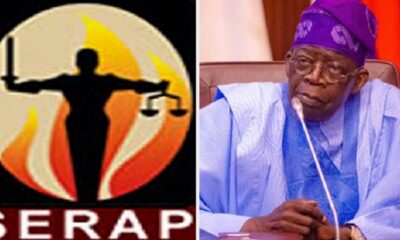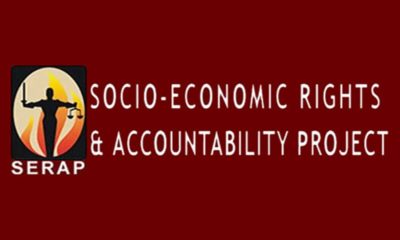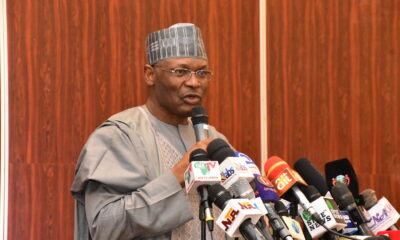NEWS
₦121.67trn Debt: SERAP Alleges World Bank Is Culpable
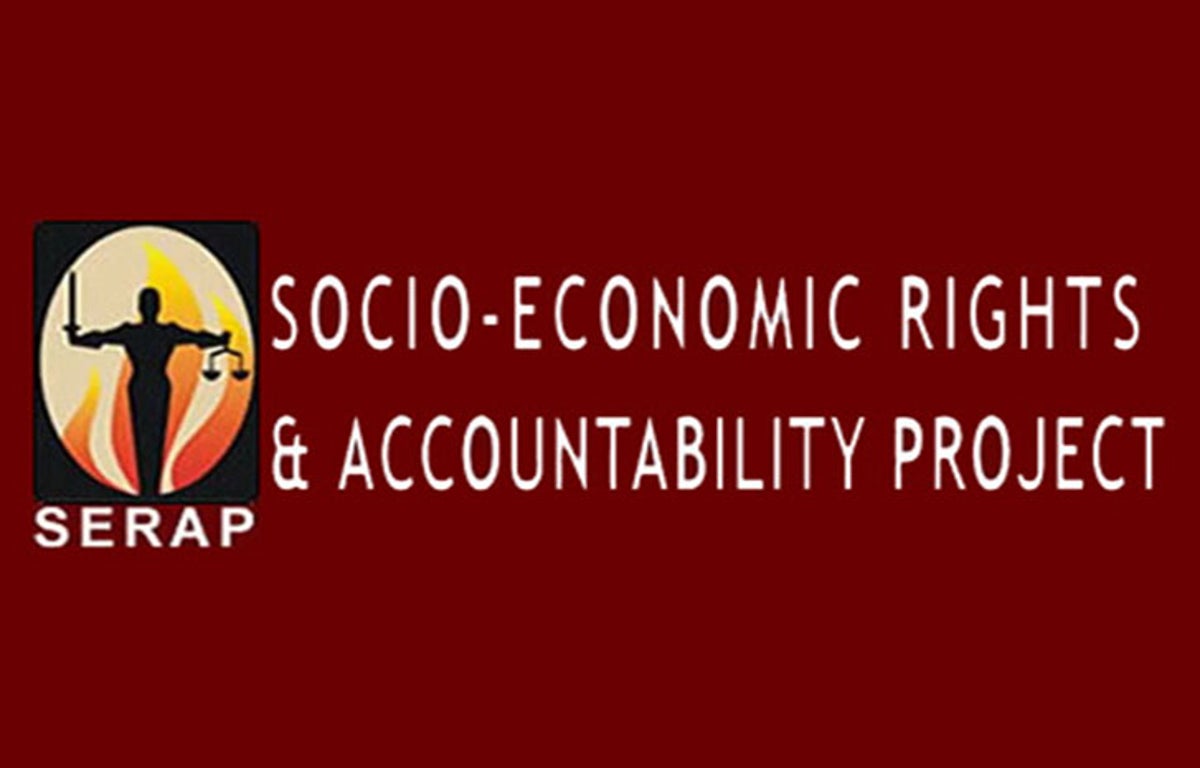
The Socio-Economic Rights and Accountability Project (SERAP) is of the view that the World Bank is culpable for the staggering $91.46 billion of public debts weighing Nigeria down, in addition to its misappropriation.
To this end, the SERAP has sent a complaint to the World Bank Inspection Panel demanding a thorough probe of the “allegations of corruption in the spending of the loans and other funding facilities obtained by the Federal Government and Nigeria’s 36 state governors and to review the implementation of all Bank-funded projects by successive governments since 1999.”
The SERAP urged the Inspection Panel “to determine the extent to which Bank Management has followed or is following the World Bank’ s operational policies and procedures applicable to the design, appraisal and implementation of all Bank-financed projects in Nigeria.”
The SERAP also urged the Panel “to determine the effect of any failure by the Bank Management to effectively implement its operational policies and procedures in all Bank-funded projects in several states on the social and economic rights and well-being of millions of socially and economically vulnerable Nigerians.”
The SERAP’s complaint followed the Debt Management Office (DMO)’s report last week, that Nigeria’s total public debt stock, including external and domestic debts, increased by ₦24.33 trillion in three months alone, from ₦97.34 trillion ($108.23 billion) in December 2023 to ₦121.67 trillion ($91.46 billion) as of March 31, 2024.
The SERAP’s averments were detailed in a letter dated 22 June 2024 and signed by SERAP deputy director Kolawole Oluwadare.
It stated, “The World Bank has over the years reportedly approved 197 projects for Nigeria, totalling over $36 billion in loans and other funding facilities [that is, $36,360,415,968.81], with little or no impact on Nigerians living in poverty.”
The SERAP said, “Nigerians are rarely informed and meaningfully and effectively consulted about several of these loans, facilities and Bank-funded projects. Nigerians continue to be denied the benefits of the loans and facilities and access to basic public goods and services.”
According to the SERAP, “Despite several loans and other funding facilities provided by the World Bank over many years, millions of socially and economically vulnerable Nigerians in several states and communities continue to lack access to regular electricity supply and have denied the benefit of renewable energy solutions.”
The complaint, addressed to the Chair of the Panel, read in part, “A recent report by the National Bureau of Statistics (NBS) revealed that over 133 million Nigerians are living in poverty, the majority of them women and children. We would therefore be grateful if the recommended measures are taken to hold the World Bank to account.
“The apparent failure by Bank Management to diligently follow the World Bank’s operational policies and procedures in Bank-funded projects have resulted in the alleged mismanagement of the loans and facilities and exposed millions of Nigerians to extreme poverty.
“We are concerned about the negative impact of the lack of transparency and accountability in the spending of loans and facilities obtained by the Federal Government and Nigeria’s 36 state governors on the social and economic well-being of millions of Nigerians and the enjoyment of their human rights.
“We are concerned that several Nigeria’s 36 states and the FCT reportedly owe civil servants’ salaries and pensions. Several states are borrowing to pay salaries. Millions of Nigerians resident in these states and the FCT continue to be denied access to basic public goods and services.
“The Federal Government and several states are also reportedly spending public funds which may include the loans and facilities obtained from the World Bank to fund unnecessary travels, buy exotic and bulletproof cars and generally fund the lavish lifestyles of politicians.
“The ₦121.67 trillion ($91.46 billion) debt represents external and domestic loans obtained by the Federal Government, the 36 state governments and the Federal Capital Territory (FCT).
“The World Bank reportedly currently has a portfolio of about $8.5 billion spread across the country. The Bank has also approved several loans and other funding facilities to the country’s 36 states including the recent $750 million credit line meant to the states to carry out reforms to attract investment and create jobs.
“The Bank recently approved a $2.25 billion loan for Nigeria ‘to shore up revenue and support economic reforms and address cost-of-living crisis in the country.’
“In September 2002, the Bank approved $129.00 million for a project titled ‘Universal Basic Education Project: P071494’ ‘to increase the capacity of states and local governments to manage and implement the UBE program effectively and efficiently.’
“In May, 2007 the Bank approved $180.00 million for a project titled ‘Nigeria Federal Science & Technical Education at Post-Basic Levels (STEPB): P074132’, ‘to produce more and better qualified science and technology (S&T) graduates’.”
In May 2000, the Bank approved $55.00 million for a project titled ‘Second Primary Education Project: P066571’, ‘to support the implementation of Universal Basic Education.’
“In December 2000, the Bank approved $86.75 million for a project titled ‘Community Based Poverty Reduction Project: P069086’, to ‘improve access of the poor to social and economic infrastructure and increase the availability and management of development resources at the community level.’
“In March 2011, the Bank approved $160.00 million for a project titled ‘Nigeria – Growth & Employment: P069086’, ‘to increase growth and employment in Nigeria.’
“In July 2020, the World Bank approved $500.00 million for a project titled ‘Adolescent Girls Initiative for Learning and Empowerment: P170664’, ‘to improve secondary education opportunities among girls in targeted areas in participating states.’
“The Bank also approved $500.00 million in June 2023 for a project titled ‘Nigeria for Women Program Scale Up Project: P179447’, ‘to promote women’s economic empowerment and enhance the economic opportunities of unbanked women.’
“In June 2020, the Bank approved $750.00 million for a project titled ‘Power Sector Recovery Performance Based Operation: P164001’, ‘to improve the reliability of electricity supply, achieve financial and fiscal sustainability, and enhance accountability.’
“In September 2022, the Bank approved $750.00 million for a project titled ‘State Action on Business Enabling Reforms (SABER) Program: P177442’, ‘to improve the efficiency and transparency of government-to-business services in participating states.’
“Many years of allegations of corruption and mismanagement of public funds including the spending of the loans and facilities obtained by the Federal Government and Nigeria’s 36 states have contributed to widespread poverty, underdevelopment and lack of access to public goods and services in the country.
“The allegations of corruption in the loans and facilities provided by the Bank calls into question the rigor with which the Bank undertook due diligence in assessing the social, economic and environmental risks of its financed-projects in the country.
“The apparent inadequacy of safeguards and accountability mechanisms for the loans, facilities and project implementation has resulted in the alleged diversion of public funds for other purposes other than those agreed with the Bank.
“The Bank has apparently failed and/or neglected to effectively apply its various operational policies and procedures to ensure the transparent and accountable spending of its 197 loans and facilities across several states in the country.
“SERAP has over the years sent several complaints to the World Bank about the lack of transparency and accountability in the loans and facilities and the projects financed by the World Bank loans but the Bank Management has consistently failed and/or neglected to take any concrete action on the complaints.
SERAP believes that we have exhausted attempts to resolve our complaints through several communications with Bank Management.
“The harms suffered by millions of socially and economically vulnerable Nigerians as a result of the alleged corruption in the spending of loans and funding facilities provided by the Bank amount to violations of human rights guaranteed under the human rights treaties to which Nigeria is a state party.
“As a UN specialized agency, the World Bank also has an obligation to promote transparency and accountability in the management of public resources and effective implementation of the World Bank and to observe the provisions of the UN Charter, as well as the UN Convention against Corruption to which Nigeria is a state party.
“The World Bank has obligations under international anticorruption and human rights law, including a responsibility to promote transparency and accountability in the management of public funds, prevent mismanagement or diversion of public funds, and redress any abuse of public trust that they may have contributed to.
“The World Bank’s board of executive directors also has an obligation to ensure that the policies and decisions of the Bank are consistent with their own statutes and governments’ transparency and accountability obligations.
“The UN ‘Protect, Respect and Remedy’ framework for business and human rights and the “Guiding Principles on Business and Human Rights among others impose corporate responsibility on the World Bank to assess potential risks of mismanagement or diversion of their investments and to seek to prevent or mitigate those risks.
“Under Article 1 of the World Bank Articles of Agreement, the stated purposes of the Bank include ‘to assist in the reconstruction and development’. The Bank is also to ‘be guided in all its decisions by the purposes.’
“Under Article 3 section 4(vii) of the World Bank Articles of Agreement, loans made or guaranteed by the Bank ‘shall be for the purpose of specific projects of reconstruction or development.’ Also, under Article 3 section 5(b), the Bank ‘shall make arrangements to ensure that the proceeds of any loan are used only for the purposes for which the loan was granted’.”
NEWS
Christmas: Shettima Assures Of FG’s Commitment To Citizens’ Welfare
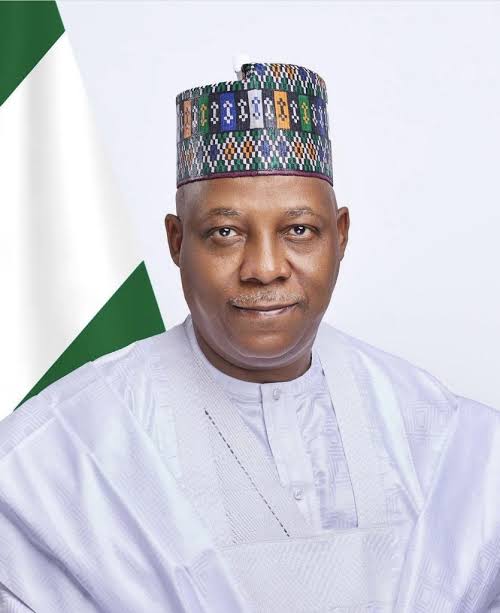
Nigeria’s Vice President, Kashim Shettima has assured Nigerians of the federal government’s dedication to national security, economic transformation, and welfare of the citizens.
This was detailed in a Christmas message on Wednesday afternoon in Abuja under the signature of the Senior Special Assistant to The President on Media & Communications (Office of The Vice President), Stanley Nkwocha.
According to the Vice President, the administration of President Bola Ahmed Tinubu remains unwavering in its focus on these critical areas, as the country looks forward to the dawn of a new year.
ALSO READ: Tinubu Sends Hearty Christmas Greetings To Christians Worldwide
He said, “In these times of economic transformation, I want to assure you that the President Bola Ahmed Tinubu administration remains steadfast in its commitment to improving the lives of all Nigerians.”
Vice President Shettima particularly urged the citizens to imbibe the virtues of national unity during the yuletide season.
“Nigeria’s diversity remains our greatest strength. Let us avail ourselves of the time provided by the holiday season to strengthen the bonds of brotherhood that unite us across all faiths and regions,” he said.
Senator Shettima assured Nigerians of the continued vigilance of the nation’s security forces, noting that “our brave security personnel will continue to work round the clock during this festive period to keep us safe.”
He said enhanced security measures have been put in place to protect the citizens during the holiday period.
“The relevant agencies have been mobilized to ensure your safety and comfort on all major routes,” he stated, urging travelers to remain vigilant.
VP Shettima expressed optimism about the nation’s trajectory in the coming year, saying, “I am filled with hope and optimism about Nigeria’s future. Together, we will build a more prosperous and united nation.
“To our young people, you are the backbone of our nation. The Renewed Hope administration is implementing various initiatives to create opportunities for you to thrive and contribute to Nigeria’s development,” he added.
NEWS
Yuletide: Adeleke Rejoices With Christians
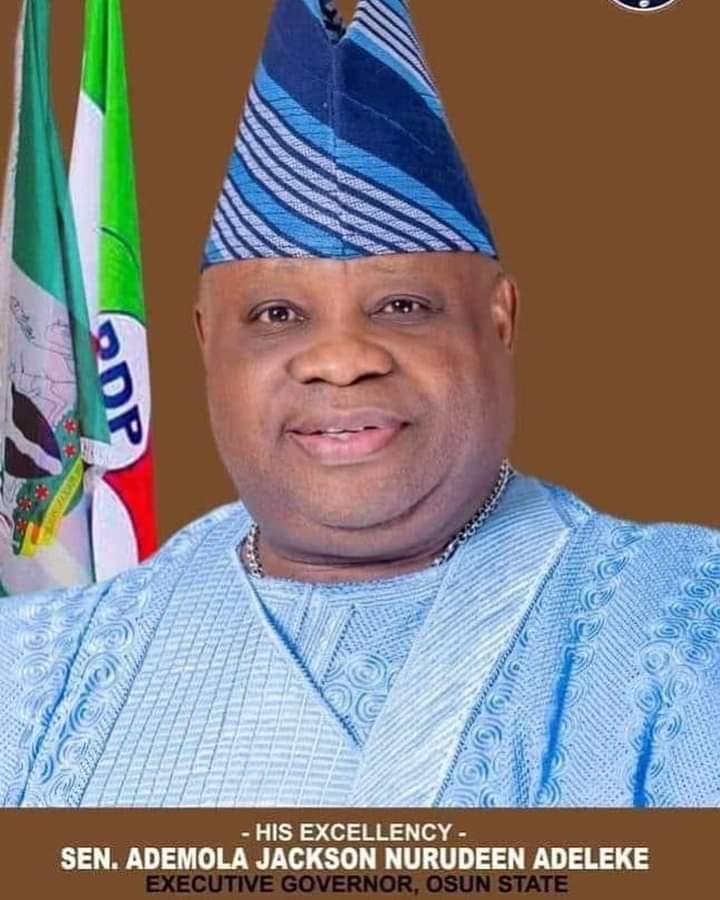
Osun State Governor, Senator Ademola Adeleke has felicitated Christians in Osun State and beyond on the occasion of the 2024 Christmas celebration, urging them to follow Jesus Christ’s example of compassion and tolerance.
Biztellers reports that Gov Adeleke described the birth of Jesus Christ as a defining moment for mankind, in a statement in Osogbo on Tuesday.
He described the festive season as a solemn reminder of the power of love and how it can save humanity.
ALSO READ: Archbishop Martins Champions Clamour For Better Life For Nigerians
While recognising unity and togetherness as an important message that Jesus Christ’s life resonates, Gov Adeleke charged Osun people, particularly Christians, to draw from the spiritual import of the celebration by sharing love and fostering harmony in communities.
In his words, “I extend my warm wishes to Christian faithful in Osun state and beyond as we mark this year’s Christmas. The birth of Jesus Christ is a manifestation of the power of love and remind us of the essence of compassion,” the Governor noted in his message.
“In the mood of celebration, I urge us to take a moment to reflect on the message of renewal that the birth of Jesus Christ signifies, promoting activities that will unite not divide, build not destroy, and bring peace not conflict.
“It is also my sincere appeal that we extend hands of kindness to the needy and the weak in the society, spreading love and generosity beyond borders. That is the essence of Christmas and it is most essential that at a time like this, no one is left to their fate.”
NEWS
Archbishop Martins Champions Clamour For Better Life For Nigerians
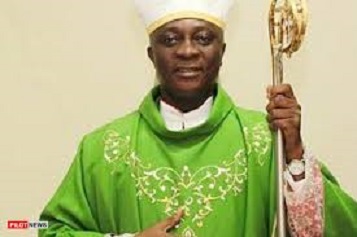
Archbishop Alfred Adewale Martins, of the Catholic Archdiocese of Lagos, has enjoined all Nigerian leaders to be more sensitive to the yearnings of the people for a better life.
This was contained in a 2024 Christmas Message to Nigerians issued in Lagos under the signature of the Director of Social Communications, Very Rev. Fr. Anthony Godonu.
According to the Archbishop there is an urgent need for a better enabling environment to allow businesses thrive in a bid to reduce the high rate of unemployment and the grinding poverty in the land.
He urged leaders to prioritise the welfare of citizens over personal needs in addressing the widespread hunger, poverty, joblessness, and insecurity ravaging the nation.
ALSO READ: Tinubu Sends Hearty Christmas Greetings To Christians Worldwide
In his words, “Even in the face of policies that are deemed to have positive results in the long-term, such as the removal of fuel subsidies, floating of the naira and the new tax reforms initiative, governments must ensure that the immediate welfare of people is not neglected but factored into the planning and execution of such policies. This is necessary, if the people for whom the policies are being made are not to die before the positive results begin to manifest.
“At the same time, government spending must be prudent and compassionate. In addition, it is necessary to pay more attention to the agricultural sector so that food security can be ensured for overall benefit.”
The Prelate described as very sad and depressing the recent loss of several lives of innocent Nigerians in Ibadan, Abuja, and Anambra in their quest to access food palliatives owing to pervading hunger across the country.
He considered it worrisome that many Nigerians now find it difficult to purchase necessities of life, especially during this festive season that should be a period of merriment, sharing of love, food, and other essentials, which are the hallmarks of the Christmas season.
To forestall a reoccurrence of such ugly incidents, the prelate urged governments, at both federal and state levels, as well as the legislative assemblies, to identify and quickly fix the loopholes in the polity that are responsible for the massive poverty and hardship which Nigerians are facing.
He advocated the appraisal of the nation’s existing laws and enactment and enforcement of only proactive policies that would open the business environment, attract investors, and create more jobs so that the citizens can afford their basic needs; rather than depend on palliatives that offer only temporary relief.
The prelate urged substantial investments in the agricultural sector of the economy to ensure the availability of basic foodstuffs; thereby reducing the high cost of essential food items like rice, beans, onions and grains.
“If citizens have food in their homes, people will not endanger their lives while scrambling for palliatives in the way it happened,” he noted with sadness.
While praying for the souls of those who died in the recent stampedes in parts of the country, he also commiserated with those who lost their loved ones, praying that Jesus, the Prince of Peace would bring solace to the afflicted, comfort to the grieving, and hope to the despairing.
“This special season reminds us of the profound love of God, who sent His only Son to redeem humanity. May the light of Christ illuminate our lives, dispel darkness, and fill our hearts with love, compassion, and kindness. As we gather with family and friends, let us not forget those who are less fortunate, the vulnerable and the marginalised. May our celebration be a catalyst for acts of charity, generosity, and solidarity,” he stated.



